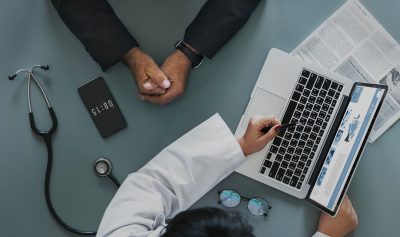Though COVID-19 has largely dominated health-related news since last year, health inequities and immigrant vulnerabilities are still critical topics that persisted before the pandemic.

Boston University School of Medicine, BU School of Public Health, Sargent College of Health and Rehabilitation Sciences and the Boston Medical Center co-hosted the “Immigrant Health Symposium” Wednesday, in honor of World Chagas Disease Day — a day first celebrated last year to raise awareness around Chagas disease, a “silenced” disease endemic in parts of Latin America.
Sandro Galea, dean and Robert A. Knox professor in SPH and a speaker at the event, wrote in an email that educating the BU community on migrant health is essential.
“Migration is one of the most important global phenomena of the twenty-first century,” he wrote. “Migrants represent a particular population with particular health needs, making them an important group to consider.”
Panelist Natasha Hochberg, associate professor at BUSM, said as an at-risk population, immigrants deserve sufficient health care infrastructure that has been systematically denied to them.
“Migrants are a particularly vulnerable population, and so we want to ensure that they have adequate resources to promote health,” she said in an interview, “and overcome some of the systemic barriers that exist.”
Hochberg, who is also the co-director of the Boston Medical Center’s travel clinic, studies tropical diseases in immigrant communities — such as the impact malnutrition and parasitic diseases have on tuberculosis — and ways to prevent international travelers from spreading disease.
Mitigating health inequities, she said, is part of the BMC’s mission “to serve the underserved and … the health needs of all patients, particularly those for whom access is an issue.”
During the event, Paul Geltman, associate professor of pediatrics at BUSM who has written specifically on health concerns among refugees and low-income children, said understanding a patients’ culture and background can help doctors better identify their expectations for their health and experience.
“Cultural considerations, it’s a huge, huge topic, so you can’t try to be the expert on this,” he said. “That being said, if you are working exclusively with patients who typically are from one predominant ethnic group or national origin, take the time to learn some of the basic concepts and principles of their cultural construct.”
Considering and caring about a migrant patient’s personal identities or history, he added, are indispensable at first encounter.
“When you’re talking with the patient, be very careful about sensitive topics,” he said. “Be careful on topics about substance use, gender and sexuality, including female genital mutilation. Be respectful of family dynamics and religious or spiritual practices.”
Hochberg said BUSM and SPH faculty, herself included, were supported by a grant from the Centers for Disease Control and Prevention to raise awareness about Chagas disease and increase testing — a needed cause, she said, due to the “huge gap” in testing and treatment.
“We know that it’s markedly under-diagnosed,” Hochberg said. “It’s estimated that around 350,000 people are likely infected with the parasite in this country, but only about four to 6% of migrants are aware of their diagnosis and less than 1% are actually treated.”
Galea wrote the health barriers immigrants face expand past the health care system itself because of pervasive social factors that limit access.
“Migrants’ health is determined by the world around them,” he wrote. “Limited economic opportunities, social isolation, and more limited access to healthcare all affect health of migrants.”
Galea wrote he hopes to see the health care system become more equitable in the face of such barriers in migrant health access.
“Health should be a means for all to live a full, rich, life,” he wrote, “and I hope to see poor health not being an impediment for any group.”
When it comes to other aspects of global health affecting migrants, Hochberg said COVID-19 vaccination efforts must acknowledge migrants’ “social vulnerability” with multiple approaches — such as increasing access to transportation, information and health services.
“There’s just many ways in which peoples’ migrant status affects their risk of COVID,” Hocherge said, “their interactions with the health care system and now their acceptance of vaccines.”
Galea wrote that the field around migrant health is growing and has a home for “excellent scholars and practitioners” to enter the field and work to tackle barriers.
Hochberg said she encourages students aspiring to mitigate health inequities to continue pursuing the interest.
“Stay passionate about it, it’s such a critically important area,” Hochberg said. “Find ways to get involved, whether it’s through the school or health department or NGOs. Learn as much as you can and find ways to advocate.”










































































































